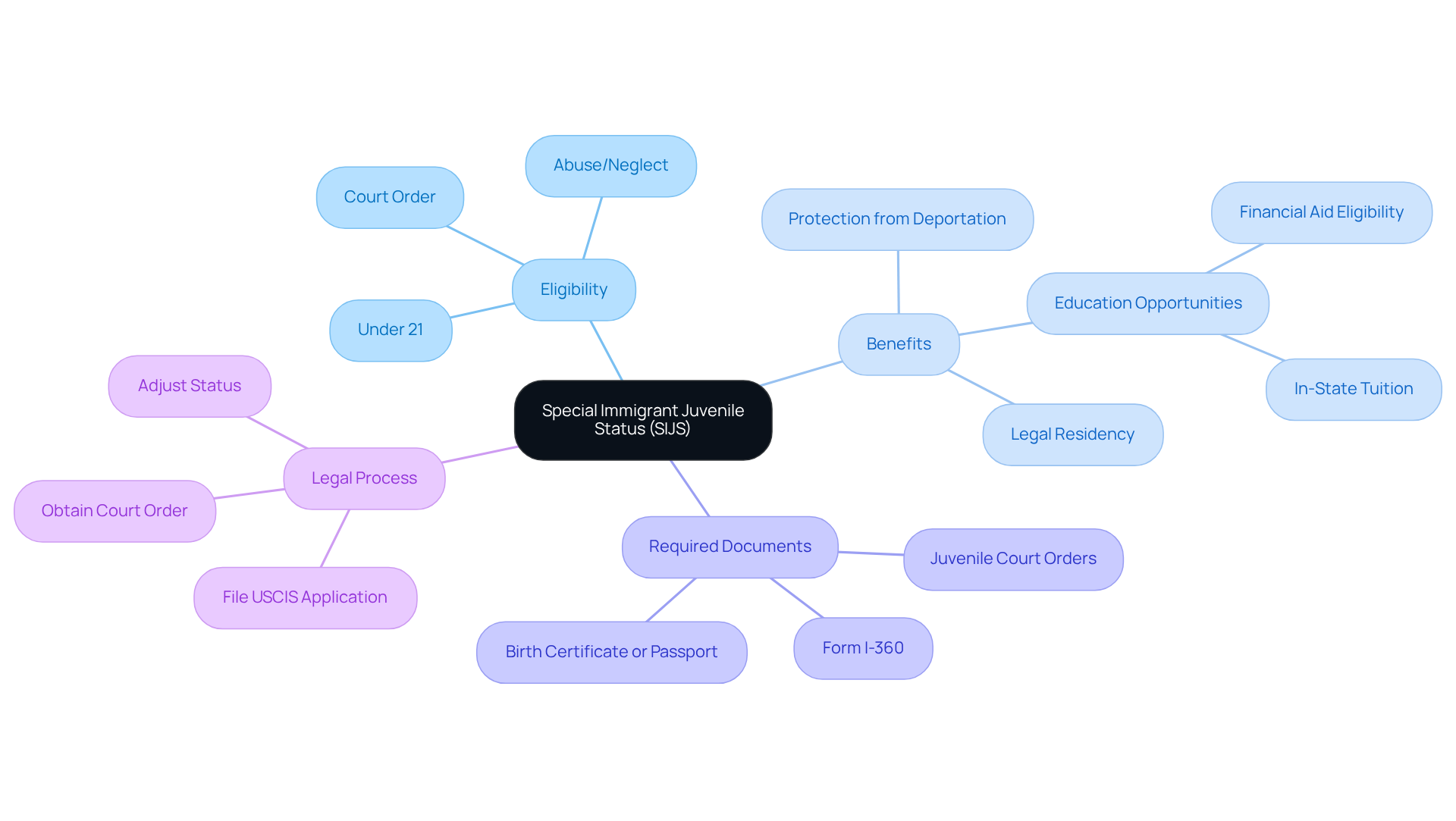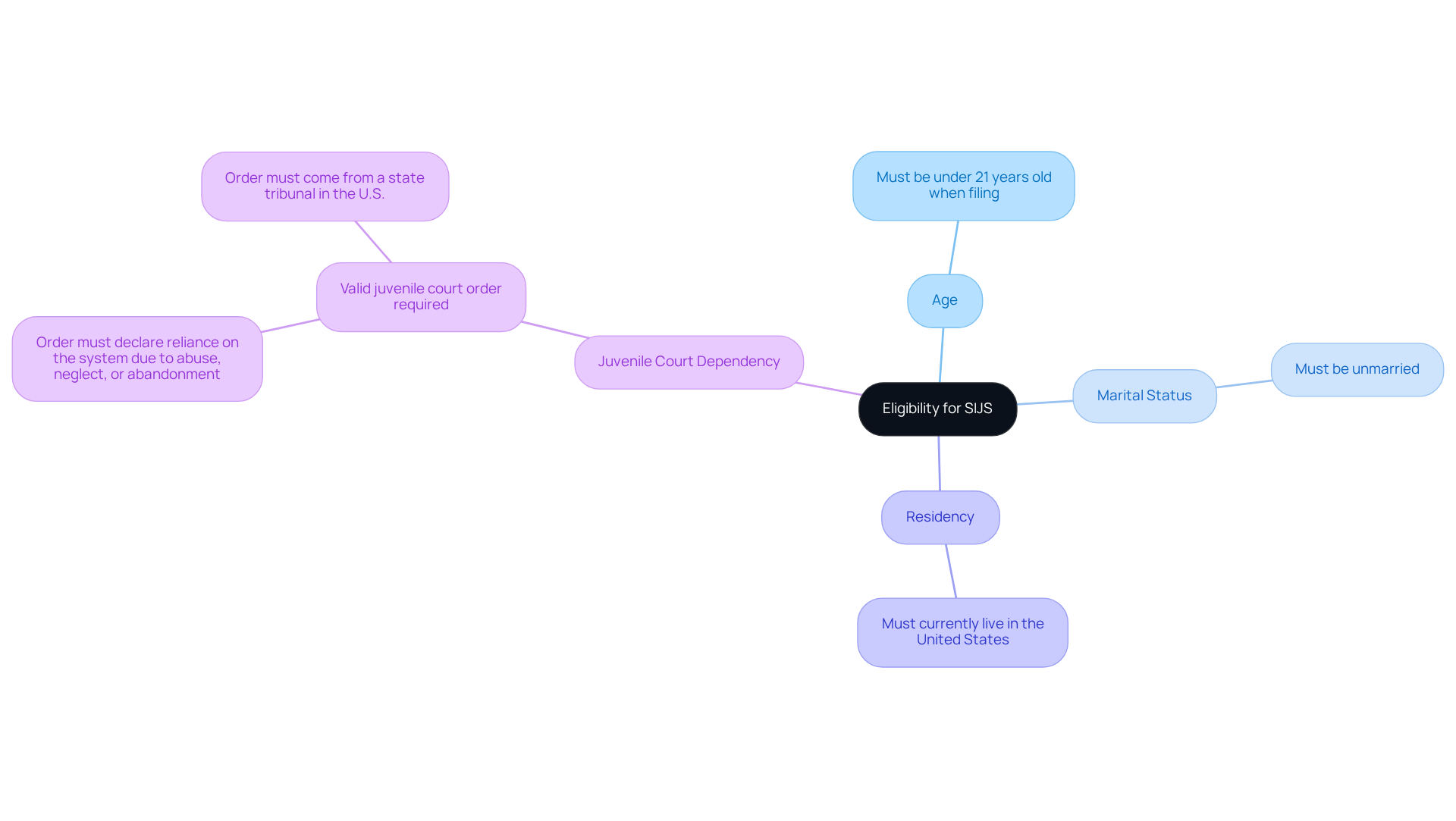Overview
Navigating the Special Immigrant Juvenile Status (SIJS) visa process can feel overwhelming. Many young people face confusing requirements and daunting paperwork. But you’re not alone in this fight. This article breaks down the essential steps you need to take, focusing on the eligibility criteria and the importance of proper documentation.
First, let’s talk about what you need to qualify. Understanding the specific requirements for applicants is crucial. You’ll find that having the right legal documentation is not just a formality; it’s a critical part of your journey. We’ll guide you through filing the petition and preparing for the interview, ensuring you feel confident every step of the way.
Remember, this process is designed to protect vulnerable youth like you, helping you secure legal residency in the U.S. We’re here to fight for your family and your future. Let’s take these steps together, so you can move forward with clarity and purpose.
Introduction
Navigating the juvenile visa process can feel overwhelming, especially for vulnerable youth seeking safety and stability in the United States. Special Immigrant Juvenile Status (SIJS) is a vital lifeline, offering undocumented minors protection from deportation and a pathway to lawful permanent residency. But let’s be honest: the eligibility requirements and application procedures can be confusing.
Have you ever felt lost in the immigration process? You’re not alone. Many young individuals face these challenges, but there’s hope. With the right guidance, you can effectively maneuver through the SIJS process and secure a brighter future. Remember, we’re in this fight with you.
Understand Special Immigrant Juvenile Status (SIJS)
Special Immigrant Juvenile Status is a vital immigration category for undocumented individuals under 21 who have faced abuse, neglect, or abandonment by one or both parents. This status not only helps in obtaining lawful permanent residency (a green card) but also offers crucial protection against deportation, allowing these young individuals to pursue a stable future in the United States. In the past year, over 100,000 children and youth have successfully secured Special Immigrant Juvenile Status, highlighting its role in providing a legal pathway for vulnerable populations.
Recent changes to juvenile immigration eligibility criteria underscore the necessity of a court order confirming the minor's dependency and the circumstances surrounding their abuse or neglect. For example, the 2022 DHS final rule clarified the process, ensuring that applicants understand the steps involved in securing this status. Legal experts stress that Special Immigrant Juvenile Status not only offers legal protection but also enhances access to educational opportunities, including eligibility for financial assistance and in-state tuition. Required documents for Form I-360 include:
- A birth certificate or passport with a certified English translation
- Valid juvenile visa legal orders for special immigrant juvenile status determinations
Understanding your legal rights and the judicial system is crucial for navigating the Special Immigrant Juvenile Status process effectively. Accessing essential legal forms and documents, such as the I-360 form and juvenile court orders, can aid in this journey. However, it’s always wise to consult with an attorney before filing any legal documents. Real-life success stories illustrate the powerful impact of Special Immigrant Juvenile Status. Many young immigrants have used this status to build stable lives, focusing on their education and career goals without the constant fear of deportation. As one immigration lawyer noted, this special immigration status serves as a beacon of hope for youth who have faced significant challenges, enabling them to thrive in a supportive environment.
Grasping the complexities of Special Immigrant Juvenile Status is essential for those seeking it, as it involves navigating both state juvenile court systems and federal immigration procedures, ultimately leading to a brighter future. Additionally, there is a growing demand for multilingual volunteers, especially Spanish speakers, to assist clients in accessing legal resources and support during the application process.

Determine Eligibility for SIJS
Navigating the path to a juvenile visa for Special Immigrant Juvenile Status (SIJS) can feel overwhelming. To qualify, you need to meet several key criteria:
- Age: You must be under 21 years old when you file your SIJ petition (Form I-360).
- Marital Status: You need to be unmarried.
- Residency: You must currently live in the United States.
- Juvenile Court Dependency: A valid juvenile court order is essential, declaring that you rely on the system due to abuse, neglect, or abandonment. This order must come from a state tribunal in the U.S.
Understanding these requirements is crucial. Missing even one can lead to your application being rejected. Did you know that over 99% of SIJS applicants who meet these criteria get approved? This highlights the importance of being well-prepared.
Common pitfalls include insufficient paperwork and misunderstanding how the juvenile system works in dependency evaluations. We understand how confusing this process can be, but you don’t have to face it alone. Ensuring you meet all the requirements is vital for a successful application. Remember, we’re here to fight for your family and support you every step of the way.

File the SIJ Petition (Form I-360)
Filing the SIJ petition can feel overwhelming, but you’re not alone in this fight. Here’s a clear path to help you navigate the process:
-
Complete Form I-360: This is your official petition for Special Immigrant Juvenile Status. Make sure every section is filled out accurately to avoid delays.
-
Gather Required Documents: You’ll need essential documents like the juvenile court order, proof of age (like a birth certificate), and evidence of abuse, neglect, or abandonment to obtain a juvenile visa. Remember, accurate documentation is crucial—statistics show that incomplete or incorrect submissions are among the top reasons for SIJ petition denials.
-
Submit the Petition: Once you’ve completed Form I-360 and gathered your supporting documents, send everything to the designated USCIS address. It’s wise to use certified mail to confirm receipt, giving you peace of mind.
-
Await Receipt Notice: After submission, USCIS will send you a receipt notice confirming that your petition is being processed. This notice is key for tracking your application and ensuring timely follow-up.
Recent updates to the USCIS Policy Manual have made things easier. If you’re within two weeks of your 21st birthday, you may be able to file in person, which can speed up the process for those eligible.
We understand how daunting this can be, but remember: we’re here to fight for your family every step of the way.

Prepare for the SIJ Interview and Follow-Up
Preparation for the SIJ interview involves several essential steps:
-
Understand the Interview Process: The interview is typically conducted by a USCIS officer who will ask about your application and personal circumstances. Familiarizing yourself with the process can ease anxiety and help you present your case effectively.
-
Practice Your Responses: Work with your attorney to rehearse answers to potential questions. Honesty and clarity are crucial; inconsistencies can raise concerns during the evaluation.
-
Gather Supporting Evidence: Compile any additional documents that strengthen your case, such as school records, medical records, or affidavits from individuals who can attest to your situation. On average, applicants submit around 10 to 15 supporting documents, which can significantly bolster your petition.
-
Timely filing for the I-360 is essential to maintain eligibility for the juvenile visa SIJS before your 21st birthday. Missing this window could jeopardize your standing.
-
Know Your Rights: If you receive a subpoena or face ICE enforcement, remember that you have the right to remain silent and the right to an attorney. Don’t open your door unless ICE has a warrant signed by a judge.
-
Follow-Up After the Interview: After the interview, USCIS will inform you of their decision. If approved, you may need to file additional forms for adjustment of status. If denied, consult with your attorney to explore possible next steps, including the option to appeal.
Recent updates indicate that as of June 6, 2025, new applicants for SIJS will not receive automatic work permits, and deferred action will only be considered if specifically requested and justified. This makes thorough preparation even more critical.
Remember, you’re not alone in this fight. We’re here to support you every step of the way.

Conclusion
Navigating the Special Immigrant Juvenile Status (SIJS) process is a critical pathway for undocumented youth facing abuse, neglect, or abandonment. This guide highlights the importance of understanding eligibility criteria, necessary documentation, and the steps involved in filing the SIJ petition. By empowering these vulnerable individuals with knowledge and resources, the SIJS process can serve as a beacon of hope, allowing them to secure a brighter future in the United States.
Key points discussed include the eligibility requirements for SIJS, such as:
- Age
- Marital status
- The need for a juvenile court order
Accurate documentation and preparation for the SIJ interview are crucial, as they can significantly influence the success of an application. Real-life success stories illustrate the transformative impact of SIJS, enabling young immigrants to thrive without the fear of deportation.
Ultimately, understanding and navigating the SIJS process is essential for those seeking this vital status. It’s important to approach each step with diligence, seek legal assistance when needed, and stay informed about recent changes to immigration policies. By doing so, eligible youth can protect themselves and unlock opportunities for education and personal growth, fostering a supportive environment for their futures.
Remember, you’re not alone in this fight. We’re here to support you every step of the way. Your future matters to us. Yo Peleo — We Fight.
Frequently Asked Questions
What is Special Immigrant Juvenile Status (SIJS)?
Special Immigrant Juvenile Status is an immigration category for undocumented individuals under 21 who have experienced abuse, neglect, or abandonment by one or both parents. It helps them obtain lawful permanent residency (a green card) and provides protection against deportation.
How many individuals have secured SIJS in the past year?
Over 100,000 children and youth have successfully secured Special Immigrant Juvenile Status in the past year.
What are the recent changes to the SIJS eligibility criteria?
Recent changes emphasize the need for a court order confirming the minor's dependency and the circumstances of their abuse or neglect, as clarified by the 2022 DHS final rule.
What benefits does SIJS provide beyond legal protection?
SIJS enhances access to educational opportunities, including eligibility for financial assistance and in-state tuition.
What documents are required for Form I-360?
Required documents include a birth certificate or passport with a certified English translation and valid juvenile visa legal orders for special immigrant juvenile status determinations.
Why is it important to understand legal rights and the judicial system when applying for SIJS?
Understanding legal rights and the judicial system is crucial for navigating the SIJS process effectively and ensuring that all necessary legal forms and documents are correctly filed.
Should applicants consult an attorney before filing legal documents for SIJS?
Yes, it is advisable to consult with an attorney before filing any legal documents related to Special Immigrant Juvenile Status.
How does SIJS impact the lives of young immigrants?
SIJS allows many young immigrants to build stable lives, pursue education and career goals, and live without the constant fear of deportation.
What role do multilingual volunteers play in the SIJS application process?
There is a growing demand for multilingual volunteers, especially Spanish speakers, to assist clients in accessing legal resources and support during the SIJS application process.




